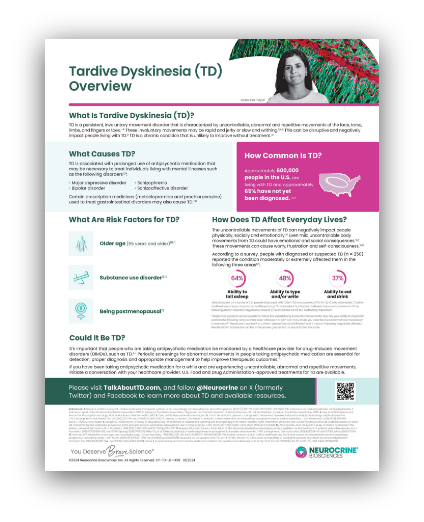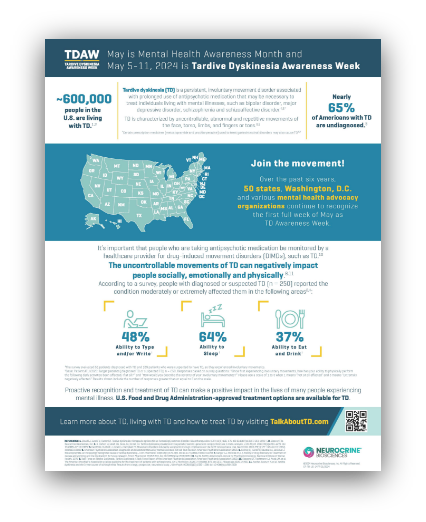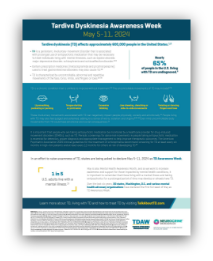Tardive Dyskinesia Awareness Week
Speak up about TD and its impact
It’s important for people impacted by TD and their families to know that they are not alone. This is why, since it began in 2018, all 50 states, Washington, DC, and various mental health organizations have recognized the first week of May as Tardive Dyskinesia Awareness Week—a week dedicated to educating people across the US on the potential physical, social, and emotional consequences of TD. Read on to learn more about TD and the importance of raising awareness.

What is Tardive Dyskinesia (TD)?
TD is a persistent involuntary movement disorder that is characterized by uncontrollable, abnormal, and repetitive movements of the face, torso, limbs, and fingers or toes.
TD is a chronic condition that is unlikely to improve without treatment. The uncontrollable movements of TD may include:

or smacking

pushing inside of cheek

blinking

side-to-side movements

dancing fingers and toes
What causes TD? And who's at risk?
TD is associated with prolonged use of antipsychotic medication that may be necessary to treat individuals living with mental illnesses such as:
- Bipolar disorder
- Major depressive disorder
- Schizophrenia
- Schizoaffective disorder
In addition to taking antipsychotic medication for a prolonged period of time, the following factors may also increase the risk of developing TD:

(55 years and above)

postmenopausal

use disorder

disorder
Why does TD Awareness matter? Because TD may be more common than you think...
It’s important that people living with TD, their families, and their care partners, know that they are not alone. Increasing awareness will help more people get the diagnosis and help that they need.
Have you or a loved one felt the impact of TD?
The uncontrollable movements of TD can negatively impact you or your loved one physically, socially, and emotionally. In a survey, people with diagnosed or suspected TD reported the movement disorder moderately to extremely affected them in the following areas*:



*The survey evaluated 51 patients diagnosed with TD and 155 patients who were suspected to have TD, as they experienced involuntary movements.
†Base: Patient ATU 2022: Target patients (n=250). Responses based on survey question: Since first experiencing involuntary movements, how has your ability to perform the following daily activities been affected, if at all? Rating scale: 1 to 5 when 1 means “not affected at all,” and 5 means “extremely negatively affected.”
Take action and speak up about TD and its impact
Proactive recognition and treatment of TD can make a positive impact in the lives of many people managing their mental illness.
It is important to initiate a conversation with your healthcare provider if you or a loved one is experiencing uncontrollable, abnormal, and repetitive movements that could be TD.
- Tell your healthcare provider how your symptoms affect you
- Discuss the physical, social, and emotional impact uncontrollable body movements may have on your life to help determine the best treatment strategies
Download and use the Doctor Discussion Guide to help start a productive discussion!
Join the conversation online
Follow and join the conversation online by sharing #TDAwarenessWeek and #Screen4TD. For additional information, you can also download and share the following resources:
How is TD treated?
Treatment may help manage the uncontrollable movements from TD
Learn more about treating TDSign up for TD info
Get even more TD info and education delivered directly to your inbox
Sign up to keep learning about TD


Share this story: